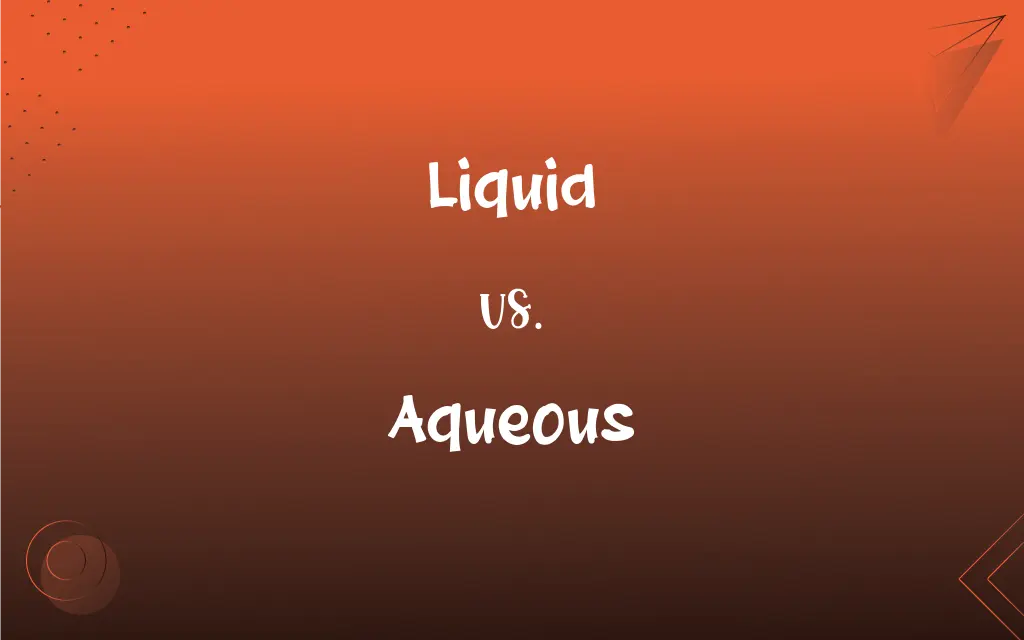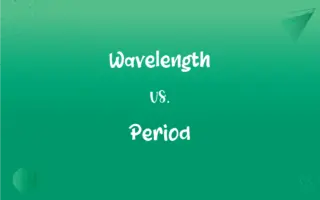Liquid vs. Aqueous: What's the Difference?
Edited by Janet White || By Harlon Moss || Updated on October 18, 2023
Liquid refers to the state of matter between solid and gas; aqueous indicates a solution where water is the solvent.

Key Differences
The term "liquid" is a state of matter, alongside solid and gas, in which a substance flows freely and conforms to the shape of its container. In contrast, "aqueous" refers specifically to a solution in which water is the solvent. This means that while all aqueous solutions are liquids, not all liquids are aqueous, as they might not contain water as their primary component.
A liquid encompasses a vast array of substances, from oils to alcohols, which can differ greatly in their chemical properties and uses. On the other hand, an aqueous solution is a subset of liquids, defined by water's ability to dissolve various solutes. While many liquids can act as solvents, an aqueous solution is exclusive to water playing this role.
The distinction between liquid and aqueous becomes crucial in various scientific and industrial applications. For instance, when discussing the boiling point or viscosity of a substance, we are often referring to its properties in the liquid state. However, when we mention the conductivity or pH level of a solution, we might be specifically addressing an aqueous solution, where water's properties as a solvent play a significant role.
The term "liquid" is versatile and can be used to describe any substance in a flowing state, regardless of its composition. Whether it's mercury, a metallic liquid, or honey, a viscous liquid derived from natural processes, the term aptly describes their state of matter. "Aqueous", meanwhile, is intimately linked with water. For a solution to be termed aqueous, it is imperative that water is the medium in which other substances are dissolved.
In everyday scenarios, we often encounter both liquids and aqueous solutions. When we pour milk, which is a liquid, into tea, the resulting mixture can still be described as a liquid. However, if we dissolve salt or sugar into water, the resulting concoction is specifically an aqueous solution. It's essential to recognize the difference: while "liquid" speaks to the state of matter, "aqueous" emphasizes the central role of water in the solution.
ADVERTISEMENT
Comparison Chart
Definition
State of matter that can flow and take the shape of its container.
Solution where water is the primary solvent.
Composition
Can be composed of any substance in fluid form.
Always contains water as a major component.
Examples
Oils, alcohols, molten metals.
Salt water, sugar dissolved in water.
Inherent Properties
Fluidity, takes shape of container, intermediate particle attraction.
Properties imparted by water, solutes dissolved in water.
Use in Context
General reference to any fluid state of matter.
Specifically refers to solutions with water as the solvent.
ADVERTISEMENT
Liquid and Aqueous Definitions
Liquid
Liquid takes the shape of its container.
She poured the liquid soap into a new dispenser.
Aqueous
Aqueous pertains to solutions with water as the solvent.
The aqueous solution turned blue when the chemical was added.
Liquid
Liquid has an intermediate level of particle attraction.
While ice is solid, when it melts, it becomes a liquid with freely moving particles.
Aqueous
Aqueous is derived from the Latin word for water, "aqua."
He noted that the aqueous sample had a pH of 7, indicating neutrality.
Liquid
Liquid can exist for a wide range of substances.
At extremely low temperatures, even oxygen becomes a liquid.
Aqueous
Aqueous implies the presence of water molecules.
In an aqueous environment, many ionic compounds dissolve easily.
Liquid
Liquid does not have a fixed volume.
He noticed that the liquid expanded when heated.
Aqueous
Aqueous describes substances dissolved or suspended in water.
The scientist prepared an aqueous mixture for the experiment.
Liquid
Liquid is a state of matter with fluidity.
Mercury is a metal that exists as a liquid at room temperature.
Aqueous
Aqueous solutions can conduct electricity if ions are present.
Salt when dissolved in water forms an aqueous solution that conducts electricity.
Liquid
The state of matter in which a substance exhibits a characteristic readiness to flow and little or no tendency to disperse, and is amorphous but has a fixed volume and is difficult to compress.
Aqueous
Relating to, similar to, containing, or dissolved in water; watery.
Liquid
Matter or a specific body of matter in this state.
Aqueous
(Geology) Formed from matter deposited by water, as certain sedimentary rocks.
Aqueous
(chemistry) Consisting mostly of water.
Aqueous
Partaking of the nature of water, or abounding with it; watery.
The aqueous vapor of the air.
Aqueous
Made from, or by means of, water.
An aqueous deposit.
Aqueous
Similar to or containing or dissolved in water;
Aqueous solutions
FAQs
How can one identify an aqueous solution in a laboratory setting?
Often, aqueous solutions are labeled with "(aq)" next to the substance dissolved in water.
What happens to the boiling point of water in an aqueous solution?
The boiling point can increase if a non-volatile solute is added, as seen in saltwater.
Is the term "liquid" specific to chemistry?
No, "liquid" is a general term used across disciplines and in everyday language to describe the fluid state of matter.
Are the terms "liquid" and "fluid" interchangeable?
While all liquids are fluids, not all fluids are liquids. "Fluid" can refer to both liquids and gases.
Is every liquid also aqueous?
No, only liquids where water is the solvent are considered aqueous.
Are all aqueous solutions transparent?
No, while many aqueous solutions are clear, they can also be colored or even opaque depending on the solute.
Can a substance be both liquid and aqueous?
Yes, if a substance is dissolved in water and the solution is in a liquid state, it's both liquid and aqueous.
Can an aqueous solution be made with any type of water, like seawater or distilled water?
Yes, but the type of water might introduce additional solutes or impurities to the solution.
Do the properties of a liquid change when it's made into an aqueous solution?
Yes, when substances are dissolved in water, the resulting aqueous solution can have properties different from pure water.
Can gases be described as aqueous?
No, aqueous specifically refers to solutions with water as the solvent in the liquid state.
What is the primary difference between a liquid and an aqueous solution?
Liquid is a state of matter, while aqueous denotes a solution where water is the solvent.
How do the properties of a liquid change in an aqueous solution?
In an aqueous solution, the properties of the liquid (water) can be altered by the solute, affecting boiling point, freezing point, and conductivity.
What role does temperature play in determining the state of a liquid?
Temperature can change a substance's state; increasing temperature might turn a liquid to gas, while decreasing might solidify it.
Can oils, which are liquids, ever be termed aqueous?
No, oils are non-polar and do not mix with water, so they can't be termed aqueous.
Can solid substances be made into aqueous solutions?
Yes, if a solid substance can dissolve in water, it can form an aqueous solution.
Are all liquids good solvents like water?
No, the solvent properties vary among liquids. Water is a universal solvent but can't dissolve oily substances.
Does the term "aqueous" only refer to pure water solutions?
No, aqueous refers to any solution where water is the primary solvent, regardless of what's dissolved in it.
Can an aqueous solution exist in a gaseous state?
No, once the solution is gaseous, it's no longer aqueous. However, water vapor can be present in the gas.
Do all liquids have the same viscosity?
No, viscosity varies among liquids. Honey is more viscous than water, for example.
About Author
Written by
Harlon MossHarlon is a seasoned quality moderator and accomplished content writer for Difference Wiki. An alumnus of the prestigious University of California, he earned his degree in Computer Science. Leveraging his academic background, Harlon brings a meticulous and informed perspective to his work, ensuring content accuracy and excellence.
Edited by
Janet WhiteJanet White has been an esteemed writer and blogger for Difference Wiki. Holding a Master's degree in Science and Medical Journalism from the prestigious Boston University, she has consistently demonstrated her expertise and passion for her field. When she's not immersed in her work, Janet relishes her time exercising, delving into a good book, and cherishing moments with friends and family.































































